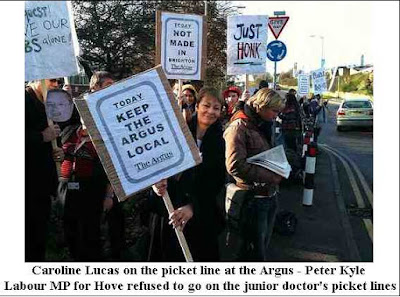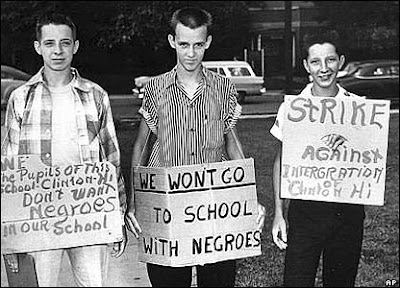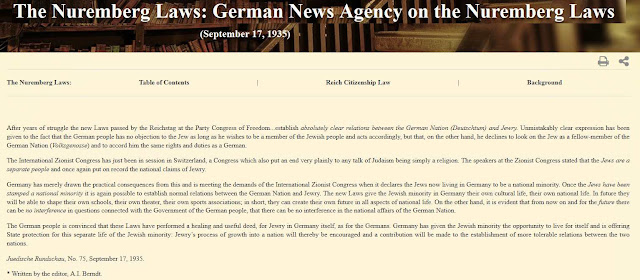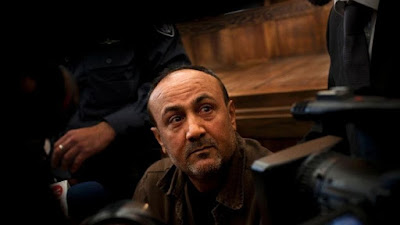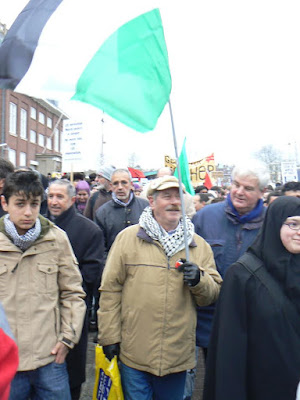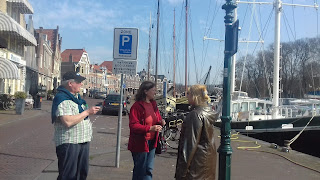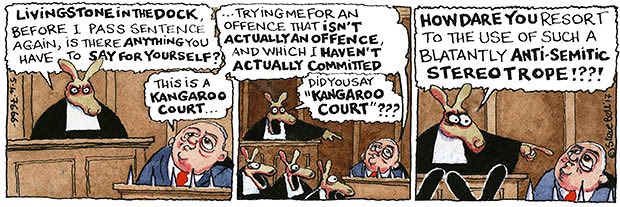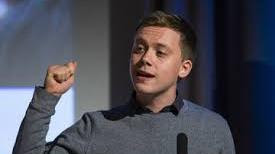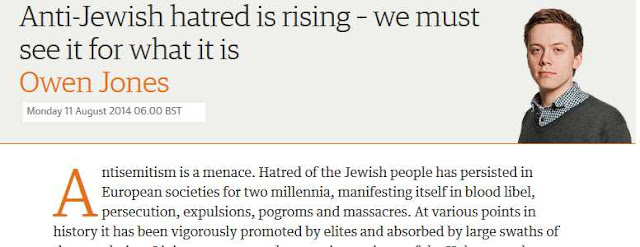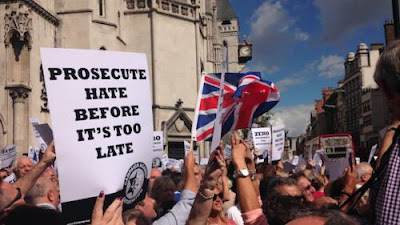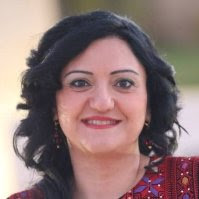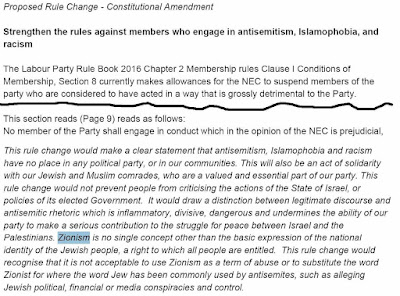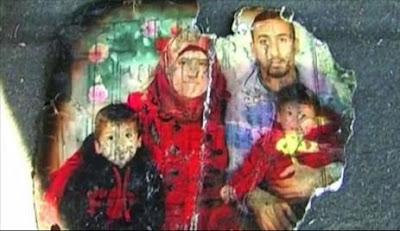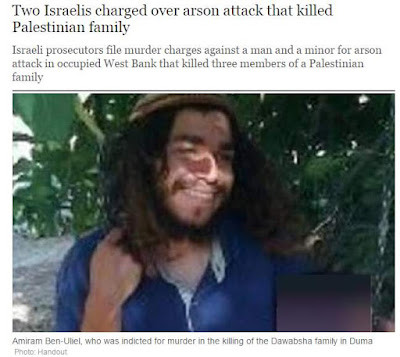Israeli Arabs are 20% of the population yet they occupy 2½% of the land
 |
| Israeli policemen stand guard as bulldozers demolish homes in the unrecognized Bedouin village of Umm al-Hiran in the Negev desert, on January 18, 2017. (AFP Photo/Menahem Kahana) |
As Ha’aretz notes, some 97% of house demolitions in Israel are of Arab houses. In the occupied territories settlers can build where they want and when they want, whereas unauthorised Palestinian buildings are regularly demolished.
The backdrop to this is the fact that 20% of Israel’s population, its Arab citizens live in just 2.5% of the land. It is the same percentage as pertained in 1948 after the expulsion of ¾ million Palestinians. At that time the Arab population was 150,000. Now it is 1.5 million Not one new Arab town has been established. Israeli planners regularly, almost as a matter of course, deny Arabs the right to construct new buildings or even build extensions to their houses.
That is why there is a massive crisis in the Arab housing sector which the State is helping to intensify. This Bill heralds another racist attack on Israel’s 20% Arab minority under the guise of enforcing the law.
 |
| Bedouins cry following the destruction of houses on January 18, 2017 in the Bedouin village of Umm al-Hiran. (AFP/ MENAHEM KAHANA) |
Couple this with racist legislation such as the Access to Communities Act which allows hundreds of existing Jewish villages and settlements to deny access to Arabs on ‘social’ grounds and then you see how Israel reinforces discrimination against its Arab citizens.
In addition half the existing Arab villages are ‘unrecognised’. Like Umm al Hiran which was recently demolished, they live under the threat that police bulldozers will come in and demolish peoples’ homes and all their possessions. There isn’t one Jewish village or town in Israel which is ‘unrecognised’. Being ‘unrecognised’ means having no running water, sewerage facilities or electricity. Literally may Israel’s Palestinian citizens live in the dark age compared to Israel’s Jews.
This is what Apartheid in the Israeli state means in practice.
Tony Greenstein
Editorial: Construction, Not Destruction
While Israeli Arabs constitute 20 percent of the population, Arab communities’ jurisdictions occupy just 2.5 percent of the state’s land area, and the process of approving new construction in Arab towns takes decades.
Haaretz Editorial Apr 04, 2017 3:26 AM
 |
| A demolished building in Kalansua, January 10, 2017. Moti Milrod |
The Knesset will be convening tomorrow for a special recess session to hold the final votes on a bill that would boost enforcement and penalties for building without a permit. The bill increases the maximum sentence for building violations to three years, does not distinguish between building violations committed for profit and those committed for lack of an alternative, and limits the role that judgment and court intervention can play while enhancing the authority of the Finance Ministry unit that enforces construction laws. This favors the administrative track over a system of checks and balances.
The bill, initiated by the Justice Ministry, doesn’t explicitly say that it’s aimed at the Arab public in Israel, but it’s clear to all that its consequences will primarily affect Arab communities. Between 2012 and 2014, 97 percent of the administrative demolition orders were issued against structures in these communities. Moreover, the bill is being promoted by a government that is pleased to pass discriminatory legislation like the muezzin law, the expropriation law, the impeachment law and the cultural loyalty law.
No one disputes that illegal construction must be dealt with, that all Israeli citizens are meant to obey the law and that the bill is worded in a totally professional manner. However, the bill should not be passed at this stage because it deals solely with enforcement, without providing a solution for the essential problem – a housing crisis in Arab communities – and without recognizing plans being put into place.
Moreover, in the past the government has established that the funding for implementation of this law will be taken from the budget designated for the development of Arab communities. This looks suspiciously as if the bill is aimed at intensifying the abuse of the Arab population and continuing the government’s incitement policy against it.
 |
| Yaqoub Mousa Abu al-Qia’an - Arab schoolteacher murdered by Israeli police at Umm al Hiran(Courtesy) |
If the Justice Ministry was really interested in solving the problem of illegal construction, it would implement those master plans for Arab communities that have already been approved, expedite the approval of those that have yet to be approved, increase the number of planning committees dealing with these communities, and only afterward declare an enforcement crackdown.
While Israeli Arabs constitute 20 percent of the population, Arab communities’ jurisdictions occupy just 2.5 percent of the state’s land area, and the process of approving new construction in Arab towns takes decades. The combination of these things and the lack of any workable alternatives cause a housing crunch and expand the scope of illegal construction. This bill does not seek to solve the problem, but merely to make life more difficult for an already distressed population.
The above article is Haaretz's lead editorial, as published in the Hebrew and English newspapers in Israel.
 |
Israel wants to build a Jewish only town in place of a Bedouin village [Anadolu] |
Police Raid Arab-Israeli Neighborhood, Injure Residents
(Jerusalem) - Israel should immediately cease the discriminatory demolition of homes belonging to Palestinian citizens of Israel, Human Rights Watch said today. Israel should ensure equal treatment in planning and zoning procedures for its non-Jewish citizens, and carry out demolitions only as a last resort along with compensation or alternative housing arrangements.
"Israeli authorities allow buildings that will benefit Jewish citizens while demolishing Arab houses next door,"said Sarah Leah Whitson, Middle East director at Human Rights Watch. "That obviously discriminates against non-Jewish Israelis, but officials haven't given any justification for this clear difference in treatment between citizens."
On December 13, 2010, Israel Land Administration inspectors and Israeli police demolished six homes belonging to Palestinian citizens of Israel in the Abu Tuk neighborhood of Lod, a city near Tel Aviv, displacing 67 members of the extended Abu Eid family, 27 of them children. On March 2, 2011, Israeli police entered the same neighborhood and destroyed the bases for two prefabricated homes the family had planned to erect there; displaced family members are currently staying with neighbors or living in tents. Israeli authorities say the homes lack building permits, but repeatedly refused to grant such permits; they argue that the land is zoned as "agricultural" rather than "residential" but have refused to re-classify the land as residential.
 |
| Arab Israelis hold protest banners against the demolition of homes in the unrecognized Bedouin village of Umm al-Hiran, January 19, 2016. (Courtesy) |
Thirty percent of the 70,000 residents of Lod are Palestinian Arabs, according to Israeli government statistics. While official figures are not readily available, more than 70 percent of Palestinian Arab homes in Lod and the nearby city of Ramle have no legal status, according to a project on Israeli cities with mixed populations run by Shatil, an Israeli nongovernmental group.
Hundreds of homes in Lod are under immediate demolition orders, virtually all of them in Palestinian Arab neighborhoods, according to the Shatil project. In addition, approximately 1,600 housing units in Lod are currently designated as "illegal," and thus subject to demolition orders, because they lack proper building permits, according to a government statement.
According to residents who are Palestinian Arab citizens of Israel, however, planning authorities repeatedly rejected their applications for permits. Israeli planning authorities by contrast recently approved plans for a seven-hectare campus for a Jewish religious college immediately beside the demolished area.
 |
| Israelis attend a protest against the recent demolition of Bedouin homes in the village of Umm al-Hiran outside the Prime Minister’s office in Jerusalem on January 18, 2017. (Yonatan Sindel/FLASH90) |
Approximately 500 police officers arrived in the Abu Tuk neighborhood at 8 a.m. on a rainy December 13 and evicted the residents of six buildings before demolishing them. The independent Palestinian Ma'an news agency described one case in which armed police broke down a door and "pointed their rifles" at a brother and sister aged 11 and 12 and told them, "Don't move," before forcing them outside. Other residents told Human Rights Watch that the police did not allow them to save their possessions before demolishing their homes.
The families, after salvaging some belongings from the rubble, pitched five tents that they bought with donations, and placed a sign over their plot that read, "Abu Eid Refugee Camp." For three months, male members of the family, about 30 people, have been living in five tents on the ruins of their former houses, while the women have been staying with neighbors.
The families had been planning to erect two small, prefabricated homes, but on March 2, around 200 police destroyed the homes' bases and clashed with residents, injuring several. Kawser Abu Eid, a 39-year-old mother of five whose home was one of the six demolished in December, told Human Rights Watch that three of her children were home during the March demolitions, and that her 12-year-old son was hospitalized with a leg injury. A female neighbor's arm was broken when she tried to protect the boy, witnesses told Human Rights Watch. A police spokesperson told Human Rights Watch that no police forces were injured.
Police arrested four members of the Abu Eid family and one neighbor for resisting the evictions. They were released the next day under conditions of house arrest. Israeli civil society workers who were following the case told Human Rights Watch that they were not sure how the authorities would enforce the house arrest order, since the residents' homes had already been destroyed.
According to residents, the family complained about the December demolitions to Brigadier General (res.) Ilan Harari, who until February 2011 served as the head of Lod's municipality, and who agreed to write to the Welfare Ministry, the Housing Ministry, and the Israel Land Administration requesting assistance for the families. Human Rights Watch does not know whether the letters were sent. To date, the residents say, they have received no assistance.
"My kids have no home; they can't study under these conditions,"Kawser Abu Eid said. "The head of the municipality promised to care for us months ago, but nothing has happened."
Israeli planning authorities have approved residential and educational building projects intended to benefit primarily Jewish Israelis on sites next to the demolished homes. In 2008 Israeli authorities began rezoning agricultural land for residential construction in the next-door Jewish neighborhood of Ganei Aviv, according to the Israel Land Administration. An October 2010 government decision urges other government agencies to complete plans for the neighborhood within six months, and directs that the land be allocated for housing for Israeli military and other security service personnel.
Directly beside the demolished homes, Israeli authorities have approved plans for a 7-hectare yeshiva (religious college) that will, according to the Lod Municipality website, "bring thousands of religious students and families to Lod." Harari said that this college will bring in "high-quality residents." On October 7, Minister of Interior Eli Yishai told Israeli media that "the thing that will help the city of Lod will be bringing another 50,000 Jews there. That's what will save and keep the city, I don't have another solution."The 50-million shekel project will be located on land previously designated as a "public open space." The Lod city council unanimously approved the allocation of the land to the yeshiva, the Lod Municipality stated.
"When it comes to housing rights in Lod, Israeli officials seem to have one rule for Palestinian citizens, another for Jewish citizens," said Whitson. "That kind of discrimination has been rejected the world over."
Members of the Abu Eid family told Human Rights Watch that they had been living in the houses in Lod since the 1950s, after Israeli authorities evicted them from their original homes in the Hula Valley region in northern Israel.
The Abu Eid family had been leasing land in Lod from the state of Israel, which controls 93 percent of the country's land and in most cases does not sell land but leases lots for 49 or 98 years. The land in question was zoned as an agricultural rather than residential area, a designation that restricted the permissible size and density of homes. Human Rights Watch has documentedthat Jewish towns and neighborhoods in the Lod area were also originally zoned for agricultural use, but authorities rezoned that land to allow residential construction.
Israeli planning authorities denied the Palestinian residents' repeated requests to re-zone the area to permit residential building. As a result, the structures that residents built lacked permits and were deemed "illegal." The Israel Land Administration first issued an eviction order against the homes in 2002. In 2010 the family lost a prolonged legal struggle when the Ramle Magistrate's Court rejected their appeal against the demolition orders, finding that the homes were built illegally on agricultural land.
In addition to the Abu Eid family, another 45 Arab-Israelis with homes in the same area received notices that authorities would bulldoze their houses by the end of 2010. Authorities demolished two Arab homes in the same neighborhood in October.
Israeli law requires the owners of demolished homes to pay the municipality for the cost of the demolition or face a criminal sentence, including imprisonment. Faced with this threat, some Palestinian Arab residents in Lod have demolished their own homes.
In October 2010 the government passed a large "emergency assistance" plan meant to "strengthen and develop the city of Lod," according to the prime minister's office. A quarter of the funds for that plan, 40 million shekels (US$11 million), will be used to create an "eviction authority" for "enforcement regarding illegal construction" for the next two years, with the possibility of an additional 10 million shekels in case of need. By contrast, the decision allocated only 3 million shekels (US $830,000) for projects that "advance" the Palestinian Arab community in the city, and even this part of the plan does not mention new building projects. The plan does indicate that authorities will re-zone an Arab neighborhood of Lod, Pardes Snir, from agricultural to residential, and construct housing units there, but notes that many existing Arab-owned buildings will first have to be demolished.
Throughout Israel, tens of thousands of Palestinian Arab homes lack required permits and are at risk of demolition. Israeli authorities demolished 165 houses belonging to Palestinian citizens of Israel across the country in 2009, according to the Arab Center for Alternative Planning, an Israeli nongovernmental organization. Human Rights Watch has reportedon discriminatory planning procedures in the unrecognized Arab-Israeli community of Dahmash, near Lod.









